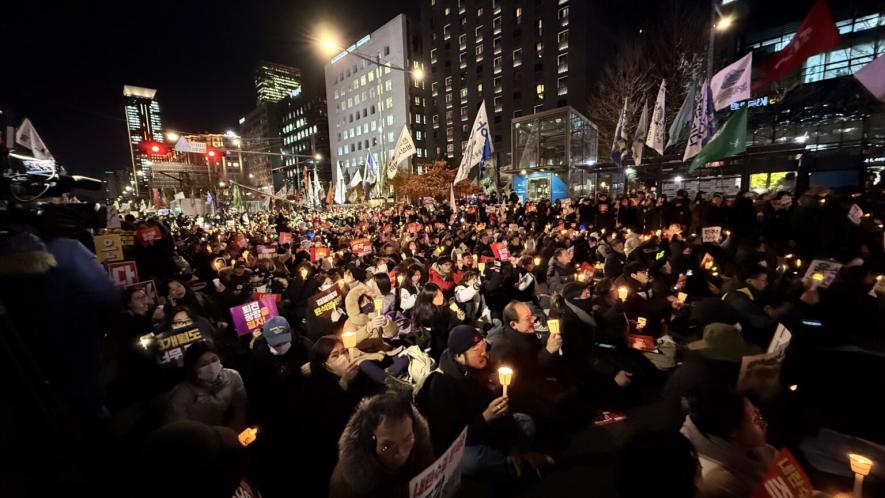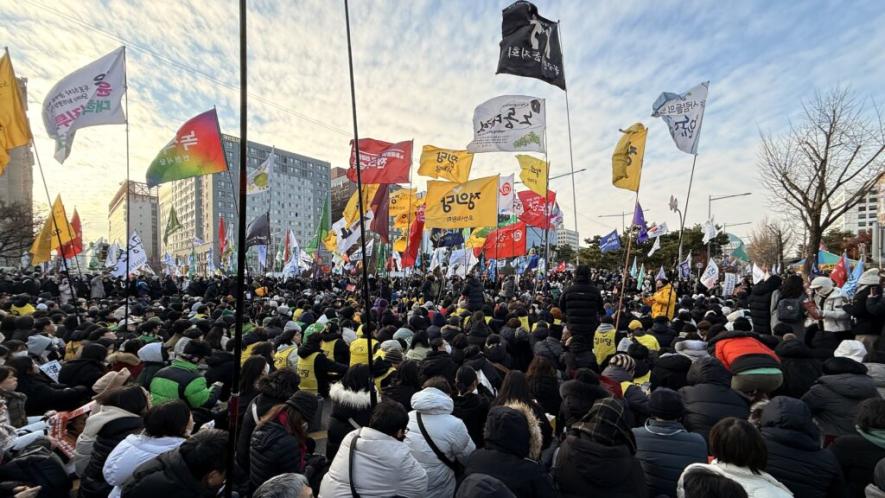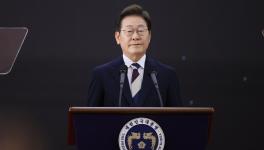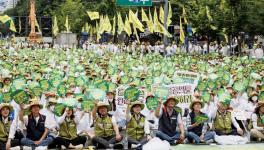South Korea: Impeachment Fails—What’s Next?

Mass protest on the night of Friday, December 6 in anticipation of the impeachment vote. Photo: International Strategy Center (@go_isc)
South Korean President Yoon Seok Yeol remains in power following a much-anticipated impeachment vote in parliament that was scuttled when the ruling People’s Power Party (PPP) boycotted the measure. While a handful of PPP lawmakers ultimately broke ranks to support impeachment, a sufficient majority to pass the measure could not be reached. The impeachment vote was held days after Yoon attempted (and failed) to establish martial law in the country.
Opposition parliamentarians have vowed to continue impeachment efforts until Yoon’s tenure in office ends. In an effort to manage the political fallout, PPP party leader Han Dong-Hoon has announced the president will no longer have a role in state affairs, and promised Yoon’s imminent resignation. The Democratic Party, which holds a majority in parliament, has denounced the maneuver as a “second coup,” and questioned the legal basis for presidential authority to be transferred to Han.
Millions of South Koreans poured into the streets on Saturday in anticipation of the impeachment vote, and demonstrations are ongoing. The Korean Confederation of Trade Unions, representing over a million workers, has also called an indefinite general strike until Yoon is removed from office. As lawmakers contend for power and the situation on the street remains fluid, a more protracted struggle for South Korea’s future appears to be settling in. To understand where things may be headed, the origins of the present crisis must be examined.
Korea: Frontline of the New Cold War
Yoon’s tenure in office has been marked by widespread dissatisfaction and growing domestic and regional instability. Elected in 2022 by the narrowest margin in Korean history, Yoon’s polarizing campaign took aim at organized labor and the feminist movement domestically, and pledged fealty to Washington in the New Cold War and a hard line against North Korea. In just over two years, his administration has brought the Korean peninsula to the brink of war, helped carve Northeast Asia into opposing military blocs, and unleashed a host of economic woes in South Korea that have wreaked havoc on workers.
While Yoon’s anti-democratic tendencies were apparent from the beginning, he was exalted by President Biden and the US media apparatus as a visionary leader. This was not a case of Washington tolerating a strategic ally’s unseemly tendencies: Yoon’s foreign and domestic policy were integral to Washington’s New Cold War and its vision for South Korea’s place in the international hierarchy of humanity.
Yoon’s war on trade unions in particular must be reconciled with US attempts to split South Korea from China and establish a neomercantilist sphere in the Pacific. This has forced a painful realignment of South Korea’s economy, resulting in years of trade deficit, mass bankruptcies among small businesses in particular (which employ over 75% of workers), and a sharp loss of purchasing power as the value of the Korean Won declined (27% drop in value relative to the dollar since 2020) and costs of living soared. Parallel to this, Yoon has investigated and prosecuted thousands of union organizers on a range of spurious charges, even driving some to the point of suicide. The New Cold War has made South Korea’s economy a sacrificial lamb for Washington’s imperialist strategy, and Yoon’s war on labor was central to eliminating workers’ opposition to US objectives.
On the military front, Yoon proved to be an even greater asset. His unbridled aggression against North Korea successfully reversed the limited gains made under the previous Moon Jae-In administration, even driving Pyongyang to the point of abandoning its longstanding policy of peaceful reunification. Frequent US war games, measured in hundreds per year, and startling deployments of US strategic assets like nuclear submarines and aircraft carriers to Korea have become the norm. Perhaps most significantly, Yoon permitted Washington to join Japan and South Korea in a common US-led military alliance, known as JAKUS. This longstanding strategic objective was always impeded by South Korean public opinion, and the demands of living survivors of colonial crimes for justice, recognition, and reparations. Like South Korea’s trade unionists, Korean survivors of colonialism were another impediment to Washington’s designs, and Yoon could be counted on to steamroll them. For this, senior Biden official Kurt Campbell called for Yoon and former Japanese Prime Minister Fuimio Kishida to receive the Nobel Peace Prize.
Democracy victorious?
While the outcome of Saturday’s vote infuriated millions, impeachment was perhaps doomed to fail from the beginning. The Democrats and other opposition parties always lacked a necessary supermajority in parliament. Moreover, the constitution requires more than six Supreme Court judges to ratify an impeachment vote, and the court lacks this quorum thanks to years of political deadlock, meaning even a successful vote would have become stalled. The defeat of martial law was celebrated by many as a victory for liberal democracy, and yet liberal democracy may prove to be its own worst enemy.

Protest outside the National Assembly on December 7, the day of the impeachment vote. Photo: International Strategy Center (@go_isc)
The maneuvers at play in the halls of power in Seoul are manifold, but Han Dong-Hoon’s statement on the PPP assuming the responsibilities of the presidency until Yoon’s resignation is revealing. While reassuring the public and the international community that a peaceful transition of power would occur, Han also declared, “Firmly maintaining the South Korea-US alliance and the trilateral security cooperation with the US and Japan is a very big and crucial task.”
The defeat of martial law through the mobilization of millions of South Koreans has set the stage for the ruling class response. South Korea is brushing against a revolutionary situation—the ruling class cannot rule in the old way, and the working class cannot live in the old way. The threat of the KCTU’s general strike in particular weighs heavily on the situation, as does the continued presence of masses of people in the streets. The PPP’s rush to remove Yoon despite their opposition to impeachment reveals a willingness to dispose of him to keep the party, and subsequently Washington’s agenda, in control.
Not every revolutionary situation ends in revolution, and this case is no different. What happens next is in the hands of South Korea’s masses, progressive organizations, and political parties of the left. Should the movement be placated by resignation alone, South Korea’s woes under Yoon will only persist and metastasize further. Should a more advanced horizon be set and the mass struggle successfully expanded, the risks of repression will rise, but so will the possibility of achieving real change.
The South Korean masses have ousted anti-democratic leaders many times, but a lasting, revolutionary transformation of society and the political system have not been achieved. The sacrifices of the masses in fighting for their country’s future have always benefited the Democrats, who have squandered their mandate and ultimately betrayed the movements that brought them to power. Consequently, each deposed leader has been eventually followed by new representatives of the ruling class’s most reactionary factions. Less than a decade ago, the mass Candlelight Movement brought down the government of Park Geun-hye. In the absence of an organized political force of the left ready to take power, the Moon Jae-In administration arose. Just five years later, Yoon was elected through the narrow openings created by Moon’s failures and betrayals. As efforts are made to prevent the PPP from clinging to power, the Korean left must also recognize the necessity of building an alternative to the Democrats to establish a political project capable of serving the working majority and bringing an end to the cycle of authoritarian backsliding and mass rebellion.
Ju-Hyun Park is the engagement editor at The Real News and an organizer with Nodutdol.
Get the latest reports & analysis with people's perspective on Protests, movements & deep analytical videos, discussions of the current affairs in your Telegram app. Subscribe to NewsClick's Telegram channel & get Real-Time updates on stories, as they get published on our website.

















